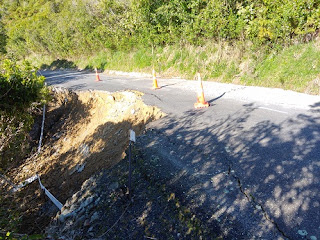David Farrar put up a fascinating piece this morning
about the two thirds of Sweden's roads that are managed privately.
As you can see from my previous post, I live on Moetapu Bay Road in the Marlborough Sounds which after storms 21 months and 9 months ago remains unfixed, frankly, dangerous, and in an interminable consultation process on whether it is even fixed.
So, quick little post simply putting up here my post this morning to the Moetapu Bay Road Facebook page .... probably ill-advised but I've given up caring about putting peoples noses out of joint or offending their sensibilities.
Post follows:
Question re road: has anyone or the road association been given an end date for this consultation process we're stuck in, because I never have in all my correspondence?
For those of us who need to move on is there the following knowns (which residents deserve [councilor's Facebook handle] to allow ourselves some modicum of planning our futures) - perhaps I've missed these dates somewhere?:
A date Stantec NZ finish what I suspect is going to be a woeful casting of our 'business case' for continued and maintained road access? [Why we're forced by NZTA to make a business case to houses that cannot be lived in other than by the existing public road still does my head in.]
The date at which the Stantec business case goes to Wellington (NZTA or whatever)?
The date - by the look of it, the future year - someone, somewhere, actually makes a decision on whether Moetapu Bay Road is maintained, or not (and we all sue council)?
If
these dates aren't known, and I can't find them, then we should have
known this timing from the get-go as part of the process, and we
certainly need these dates from this point. I say it over and over, this
limbo for years is not acceptable (not to fix the road, I realise if we
are 'the chosen ones' to be fixed, that will take a while, but to know if we will be fixed
and retain road access altogether, because it's not a given). The ones
making these decisions in Wellington on big salaries wouldn't put up
with their lives interrupted like this. I'm worried we're going to be
forced to wait while two thirds of the North Island has to go through
this process. They're just roads. They can be fixed. Do the engineering
and just fix them. We're nominally a first world country. My latest
correspondence has been requesting the relevant MPs please get us out of
the Paris 2030 insanity whereby between now and 2030 New Zealand will
be sending $12.8 billion (that's billion) of our tax
money to overseas countries to reduce their emissions because James
Shaw signed us up to such unrealistic cuts, and we can't stop the damned
cows farting, so we're to be penalised. Think of how many roads can be
fixed with that money (our tax money). I personally
think, as a taxpayer, and let's face it this money's value is simply
going to be destroyed for a pointless symbolism, this constitutes an
outrageous theft by Wellington - how dare they throw out money away like
confetti.
This stuff really exercises me .. anyway, on matters revolutionary ...
Outside of the above, and yes I've reached 57 years old and yet have no judgement whatsoever, I've been thinking. Per below article I was stunned to read this morning that two thirds of Sweden's roads are privately operated and managed by Private Road Associations. I'll copy the article below, but, and admittedly not knowing the costs to fix our road, in general it's got to be worth looking at for New Zealand. Re the roads in Sweden obviously there are rates reductions, etc, as they are managing their own roads. As all we get on Moetapu Bay Road is the road all our houses were built for access from - and that's the only 'business' case we needed - I think that translates to not only a 100% rates reduction down to zero, but also autonomy from state, council and Iwi altogether. We wouldn't have to consult them on what we do with the road, it would be our road, and not only that, if we want to say protect our own private properties from future damage with retaining walls, etc, and if it affects no one else - common law tort could solve any disputes arising - we don't need council consents and I'll never understand in a free Westminster system - quaintly still called democracy, although there's not much left of that anymore - why we are effectively forced by Council now to obtain Iwi sanction for what we do with private properties (the first has become an expensive paper shuffling nonsense moribund by ludicrous health and safety aka traffic management, plus regulation on top of regulation on top of regulation, the latter just leads to graft, corruption and an uncivil and non-democratic society).
I realise my thoughts are tantamount to revolution back to private property rights and volition, but that's only because I think we need such a revolution, so this post is mainly about my opening questions regarding timing. Here's the piece about Sweden however, from Kiwiblog:
Many times in the discussion of the functions of government, and the line between public and private, the discussion of roads comes up. I’ve always believed that roads are a great example of a public good that should be (in the main) provided by the government/taxpayer. There are many externalities and benefits, and it’s hard to exclude those who don’t pay.
Obviously toll roads are the exception, but they are really only possible where a) there’s an alternative route, and b) you can limit access to the road.
So this article about how many roads in Sweden are funded was very interesting.
Two-thirds of roads in Sweden are privately operated and managed by local Private Road Associations (PRAs). These road associations are composed of homeowners who live along private roads. An estimated 140,000 kilometers (about 87,000 miles) of roads are the responsibility of 60,000 PRAs.
This is a really interesting model. When I look at many rural roads that receive relatively little maintenance, I can see the logic of letting those who live on the road own and maintain it. Presumably they can maintain a lot more cheaply than the local council would, and the local council not having to maintain those roads would result in lower rates. Or, to put it another way, the money that rural people might have spent on rates that are syphoned off to fund other roads, or used inefficiently by council, can instead be spent directly on maintaining their road, to the standard they’re willing to pay for.
The costs of upkeep are divided among members of the association. PRAs that do not accept government subsidies can prohibit traffic at their discretion. Those that receive subsidies must allow all vehicles to travel on their roads. Regardless of whether they receive funding, however, the associations may not ban horses, bicycles, and pedestrians from using the roads.
I wonder how many other things I’ve always considered to be public goods also have really interesting private models around the world.



Comments
Post a Comment